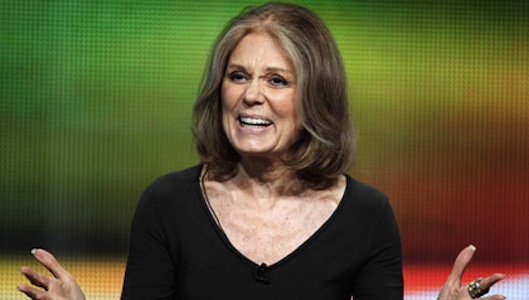Feminism has grown, evolved, expanded, and it no longer fits behind the pretty, white, straight face of its early champions, says Emily Heist Moss.
Gloria Steinem turned 80 today. She began her ninth decade with a trip to Botswana and a lionizing birthday card from the New York Times’ Gail Collins in which Collins referred to her as the “face of feminism.”
Out of curiosity, I texted my 22-year-old brother a picture of Gloria. He recognized neither her current photo nor the infamous undercover Playboy bunny shot of 1963. Her name didn’t even ring any bells. I asked him who he would consider to be the face of feminism, if he had to pick someone, anyone. I crossed my fingers and prayed to Elizabeth Cady Stanton that he wouldn’t come back with Miley. Rosie the Riveter, he said, but admitted he was probably skewed by my blog, Rosie Says.
Although I decided late night texting wasn’t the time to relay all of my favorite things about Gloria, I made a mental list for the next time we were stuck in a car together. I’d start with her original reporting in “I Was a Playboy Bunny.” I’d talk about Take Your Daughter to Work Day, and what it meant to show girls what their parents did when they left every morning, and that they themselves had options. I, for one, got an awesome tote bag and played with giant computers that hummed when you launched MS Paint. I can thank Gloria and the Ms. Foundation for Women for that. I’d skim past the political, because her co-founding of the National Women’s Political Caucus in 1971 with Bella Abzug, Myrlie Evers, and Shirley Chisholm would be just another list of names I’d have to explain.
I’d finish my lecture with my strongest argument: her commitment to fairness. I’d read him my favorite Steinem essay, “If Men Could Menstruate,” a tongue-in-cheek hypothetical about how differently we treat male and female bodies:
Men would brag about how long and how much.
Young boys would talk about it as the envied beginning of manhood. Gifts, religious ceremonies, family dinners, and stag parties would mark the day.
Sanitary supplies would be federally funded and free.
Fairness, the simplest concept of all. If roles were reversed, how would you want the world to be? If your number had come up different, what would you hope for? What injustices would you resent? That world, the one in which any lottery ticket you draw has equal access to opportunity, that’s the world we are working toward. Slowly.
The Collins essay got me thinking about who the face of feminism is today. Sheryl Sandberg? Michelle Obama? Beyonce? Caitlin Moran? The ladies of Jezebel? Pussy Riot? None are without their controversy. I googled the phrase, as Millennial bloggers are wont to do, and found the following in the top page of search results: several Rosie incarnations, including two in headscarves; two Kim Kardashians; a Ryan Gosling meme; a poster from SlutWalk about clothing not equaling consent; Barack Obama’s “This is What Feminism Looks Like” Ms. cover; a gif comic mocking girls who blame bitchery on their astrological signs; and three “I need feminism because…” signs held by a white woman, a white man, and a black man and black woman together.
This is where you’ll find us now. Feminism has grown, evolved, expanded, and it no longer fits behind the pretty, white, straight face of its early champions. Feminism is Muslim, it is male, it is black, white, brown, it is queer, it is sex-positive, it is even—gasp—self-deprecating from time to time. It doesn’t always agree with itself. There is infighting now, as there was then, with factions disagreeing about tactics and priorities. Although I wish it were less caustic, I’ll take the participation of many over the unified, homogenous voice of the few any day.
The fact that feminism doesn’t have a singular face anymore, even one as accomplished as Ms. Steinem’s, is progress. And I think she’d agree.
Role/Reboot regular contributor Emily Heist Moss is a New Englander in love with Chicago, where she works in a tech start-up. She blogs every day about gender, media, politics and sex at Rosie Says, and has written for Jezebel, The Frisky, The Huffington Post and The Good Men Project. Find her on Facebook and Twitter.
Related Links:

